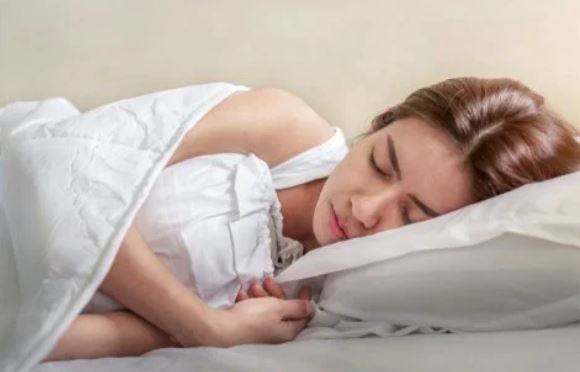Sleep spasms are, in fact, involuntary jerks that occur mainly between wakefulness and sleep. They are also called myoclonic spasms or hypnic jerks. They are strong and brief muscle spasms.
When they occur, sleep spasms can awaken both the sufferer and his partner. In addition, they are usually preceded by an intense dream or hallucination. The most typical is the feeling of falling down the stairs or somewhere deep.

Although sleep spasms can be worrisome or uncomfortable, they do not really pose a serious problem. In fact, it is a situation experienced by 70% of the population.
Although it is not yet known for sure why they are produced, certain factors that favor sleep spasms are known. In this article, we explain it to you.
Why do spasms occur when sleeping?
It is thought that the cause of sleep spasms lies in the preparation of the body for sleep. The body tends to slow down all functions, such as breathing and heartbeat. In addition, motor function stops. Thus, the body ensures that, during that time, the body does not react and remains safe.
Other theories maintain that these spasms are remnants of our ancestors. In a study conducted at the University of Colorado (USA), led by Coolidge, it is said that:
“The hyphenomic shaking could be an archaic reflection of the misinterpretation that our brain makes during the muscular relaxation of the beginning of the dream as if it were a signal that would alert our sleeping ancestors that it is falling from the tree.”
This suggests that sleep spasms are vestiges of a defense mechanism. In the same way, stimuli such as noise or lights can trigger them. On the other hand, it is thought that they are influenced mainly by the type of life that we currently carry.

What factors can influence?
As we all know, the current pace of life affects many areas of our health. Well, the dream is one of the most affected. It is believed that leading an accelerated pace of life, sleeping a few hours a day, can trigger sleep spasms. Other factors that seem to influence are:
- Anxiety and stress
- Fatigue.
- Sleep deprivation, that is, spending more than 24 hours in a row without sleeping.
- Consumption of caffeine.
- Other stimulant drugs
Any type of problem that disturbs relaxation at bedtime can increase these spasms. In fact, it is also believed that nicotine and even exercise may be related.
Related Article: 3 natural remedies for gallbladder cholecystitis or inflammation
How to reduce spasms when sleeping?
Since it is intuited that sleep spasms may be due to anxiety or stress, the first step is to try to reduce these. For this, it is essential to change the mentality.
The routine may seem suffocating on numerous occasions, but we must focus on maintaining calm. Trying to see things less drastically can help us reduce that constant anxiety.
In the same way, it is essential to lead a healthy lifestyle. Good nutrition and moderate exercise are essential measures to achieve quality sleep. In fact, doing sports such as yoga or pilates, which help you manage stress, are perfect alternatives.

Within the diet, it is necessary to reduce the intake of caffeine. It would also be advisable to stop smoking or, in the case of other toxic habits, eliminate them completely. Any exciting substance will promote these spasms when sleeping.
Also, try to establish a good sleep schedule. Try to organize your day to get, at least, 8 hours to devote to rest. Try not to take the problems to bed. The thoughts that cloud your mind will also be related to your way of facing the dream.





